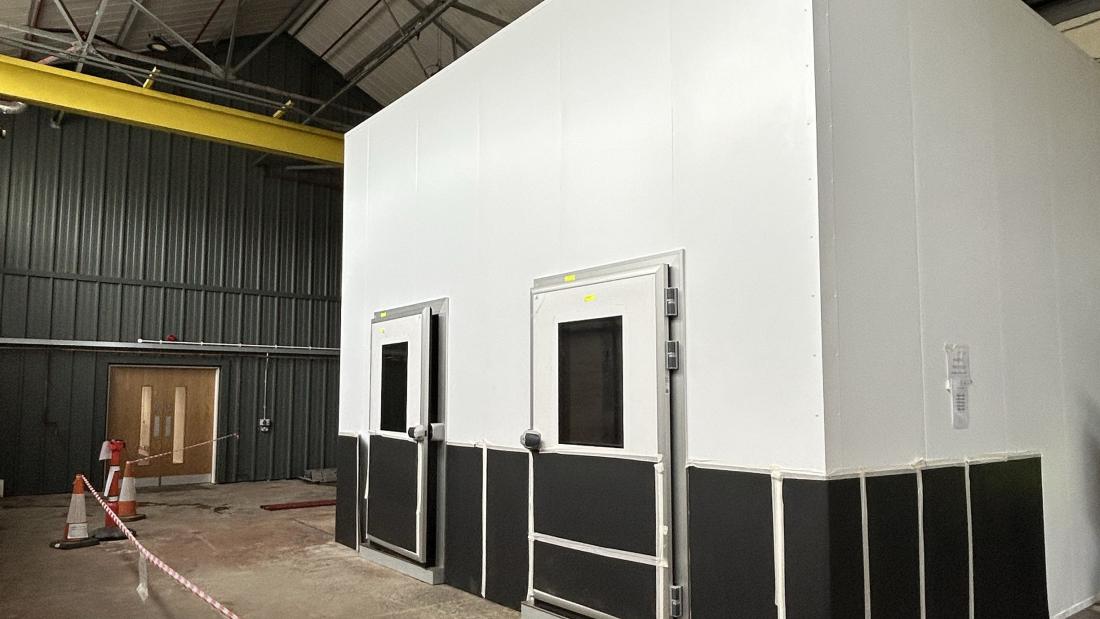The facility, funded by the UK Government through the Shared Prosperity Fund, is being developed through a collaboration between Bangor University, Adra and Busnes@LlandrilloMenai and, and constructed on-site at Tŷ Gwyrddfai by Enbloc.
Partners are keen to collaborate on research projects with both large companies and SMEs to test their products in a dual controlled environment. The facility will create and maintain two distinct thermal and environmental conditions simultaneously, simulating internal and external environments across a subdividing 'Test Wall'. The 'Living' side is designed to replicate the lighting and temperature levels of a comfortable home, while the external side mimics three specific conditions—freezing, cold, and hot—where humidity control impacts the use of the water system.
Professor Graham Ormondroyd of Bangor University’s BioComposites Centre, which specialises in research into bio-based alternatives to synthetic materials said, “The new facility at Tŷ Gwyrddfai is such an exciting step forward. It will allow for the testing of new construction materials in full wall make-ups at a scale equivalent to full scale houses, which is a great leap forward for us in terms of research capability.
“This facility will allow us to test materials at scale, and the interaction between indoor and outdoor conditions, including the simulation of rain events. This will allow Bangor University to study how the changing environment will affect current housing stock and future building materials.
“The facility will also be used to evaluate the effects of detailing such as windows and sills on building facades, and the ability of this detailing to lower energy bills and protect materials in the future.”
In the longer-term, the Bangor University team hopes to carry out research projects into the effects of climate change on whole wall make-ups, using localised climate change predictions available through the Met Office to simulate future weather patterns.
“The effects these changes in climate have on new, often biobased, materials used in modern methods of construction will be tested, leading to further research into the protection that these materials will need in future climates,” adds Graham.

Professor Paul Spencer, Pro-Vice-Chancellor for Research at Bangor University said, “We’re very pleased to be moving on to the next stage in our partnership with Adra and Busnes@LlandrilloMenai at Tŷ Gwyrddfai. The research possibilities offered by this facility will allow us to work collaboratively with industry to better understand how climate change will affect the construction sector and the products they use. There is also significant potential to study how increasing temperature and humidity impacts health and how measures to improve existing housing can be used to support local power generation, improve internet access and provide additional social care support.”
Rhianwen Edwards, Director of Commercial and Work-based Learning added, “Busnes@LlandrilloMenai is proud to be a part of this groundbreaking project at Tŷ Gwyrddfai. This facility represents a unique opportunity for our students and staff to engage with cutting-edge research that will directly contribute to the future of sustainable living in Wales. By collaborating closely with industry leaders and academic partners, this partnership fosters innovation that not only advances the decarbonisation agenda but also equips our learners and businesses with the skills and knowledge to drive positive change in their communities.”
Iwan Trefor Jones, Chief Executive of Adra, said: “This is yet another significant piece of the jigsaw in the development of Tŷ Gwyrddfai.
“The flagship facility is fast building a reputation as a centre of excellence. It’s the first decarbonisation hub of its kind in the UK and will be a sector leader in innovation, training and innovation - a game changer for local communities as we plough ahead with our decarbonisation programme.
“The research and innovation being tested in the lab will contribute significantly towards reducing carbon emissions in our homes, which in turn will reduce the impact of increasing fuel and energy costs by making our homes more energy efficient and improve the quality of life for our tenants”.

